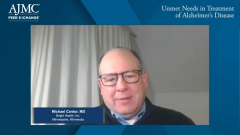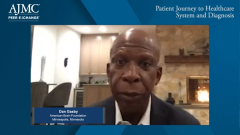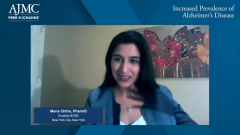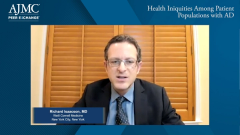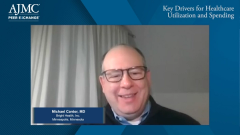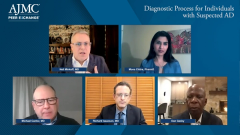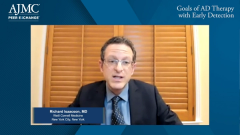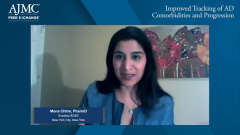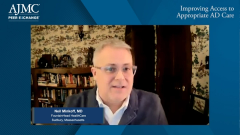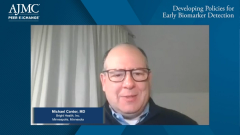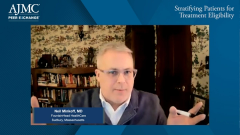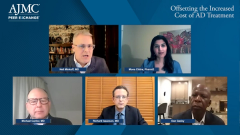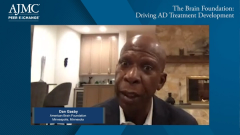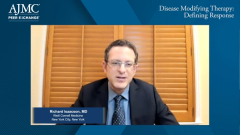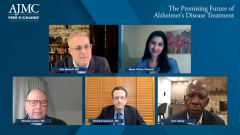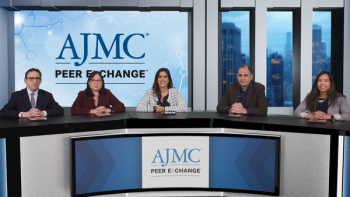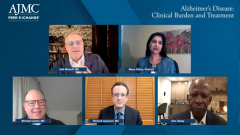
Goals of AD Therapy With Early Detection
Experts in the management of Alzheimer disease consider the future goals of therapy in tandem with the development of early detection polices.
Episodes in this series

Neil Minkoff, MD: How do we get to the truth? Earlier, you mentioned having benefit structures that are designed to look into these things to try to be more supportive, if you will. What are some of the things that you could speak about, whether it is Medicare Advantage, other supplemental benefits, or benefit designs that are trying to encourage disease management, cognitive assessments, and caregiver burden?
Mona Chitre, PharmD: Educate, empower, and inform. How can we as a society collectively tell the truth? We are doing this across other conditions, perhaps the sexier ones—those that may be more of a straight line perhaps, such as diabetes, heart disease, and depression, by making mental illness less of a stigma. How do we educate, empower, and inform? In this condition, we not only empower the individual patients but also their caregivers, of course. That is the first thing we can do collectively as a society. We have all heard about this disease, and we have felt the disease, but let’s be a bit more tangible. Let’s create a playbook. That first event when you start talking about something like a sandwich in the middle of your presentation. That may be something that our caregivers need to pay a bit more attention to. I would say that, as a society and as a plan, there is opportunity there.
CMS [Centers for Medicare & Medicaid Services] has made a huge investment in this area in terms of risk adjustment. Now that dementia and Alzheimer disease are in the risk adjustment sphere, it enables our providers to spend a bit more time to get some quantification related to reimbursement for those difficult and long conversations related to what this diagnosis could mean and what multiple cognitive tests are required to get a diagnosis.
The third and fourth areas are for the work we are doing nationally around the social determinants of health, ensuring appropriate populations are getting care delivered to them and getting information delivered to them in a way that is meaningful to them. We are still in our infancy, but we are making progress, and it is a concerted effort that is not just a 1-year pilot. We are committed to ensuring the health of America.
Finally, we also have those benefit designs. As Dr Cantor mentioned, we have various strategies across all of our lines of business. In Medicaid, there is long-term care as a benefit, but we also have personal care services, which is an added benefit. In Medicare, we have the supplemental benefit as well as special needs plans that start to target more of the differential of our patient population. In commercial, we of course have various benefits in the commercial segments. Neil, there is a lot that we could and should do, and we will plan to do that as this becomes more and more of a focus for our populations.
Neil Minkoff, MD: Let me turn to Dr Isaacson. Richard, you spend a lot of time working on early detection and prevention. As the benefit structures mature, and we get more and more benefit structures that are richer, and we get more and more commitment to earlier detection, what does that look like to you? What would be the appropriate standard of care or treatment pattern? How would you find it and then manage it? What would you be doing to see how the improvement is being measured?
Richard Isaacson, MD: I would say a couple of things. We know the science that Alzheimer disease begins in the brain decades before a person is diagnosed with dementia, and we understand that there are over 46 million Americans who are projected to have preclinical Alzheimer disease, which means that the pathology of Alzheimer disease is in their brain but with no clinical symptoms. Instead of a disease-based, treatment-based culture of medicine, we instead have to shift at some point to prevention. That is challenging because, firstly, it is quite costly, although the latter may be pretty costly itself. I do not know that I have all the answers, but I would say that earlier is better.
How do we get reimbursements for this? I am a clinician. I treat patients based on modifiable risk factors that I can treat. That is what we do, and we treat patients for their medical problems that are related to cognitive decline and dementia. However, we have patients who come in who do not have symptoms and do not have a cognitive trajectory for which we can bill for memory loss or anything else. They do not have a risk factor that we can treat or bill for. In those cases, we lose a lot of money, to be honest. We do not go and bill patients for additional care if we do not have a diagnostic code that will reimburse. We take insurance, and if we do not get reimbursement, we lose that money.
This is something that we [at Weill Cornell Medicine] realized, and my chairman and the folks at the school and the hospital made a commitment to do this even though we could potentially lose money. We had to because we had to start earlier, and there was a demand for this type of service. Honestly, there was a need for this type of service. How this will be sorted out, I am not entirely sure. We now have published studies that show comparative effectiveness research, which is a newer style of research where we try to analyze the real-world results or the real-world findings of lifestyle interventions and risk-factor reduction: interventions that modify risk factors and modify a person’s risk of cognitive decline. We have shown that these outcomes can be positive, cognitive outcomes can be improved, and risk can go down, so I hope that these models change things.
Neil Minkoff, MD: Michael, from your point of view, hearing that, I know that you have done similar work at different stages, how do you step back and look at what this means to the system in terms of measuring outcomes and correlation with cost? As Richard said, this might be costly, but that is also costly. How do you start to parse that through?
Michael Cantor, MD: Where I trained, there was something called the Mind Brain Institute. This was a long time ago now. It was about the recognition that vascular risk factors were important to cognitive health. With Alzheimer disease and vascular dementia, there are a lot of mixed cases of both in the United States population, so the modifiable risk factors for vascular disease also impacted brain health and/or cognitive status. With modifying blood pressure, modifying the lipids in the blood, making sure people stop smoking, treating their diabetes, and doing the things that we already know can help or harm you from a blood vessel health perspective, there are a lot of blood vessels in our brains. If we take care of our blood vessels, then we take care of our brains.
Unfortunately, let’s take blood pressure as an example, we are not great at managing blood pressure. There are a lot of people in the United States who do not know that they have high blood pressure. Those who do know, some fraction, a third or a half, are poorly managed or not managed well at all to the level where they are within their guidelines. Thinking about how do we understand that brain health is part of a larger series of challenges that we face, from managing vascular risk factors and other risk factors. Even with the cognitive exercises that are now available, people can do brain exercises, and that seems to be helpful for some people as well in terms of forestalling some of the aging related declines we can see in cognition.
The opportunity exists to tie this all together and to say, “What does health mean? How do you maintain your health?” If you do the things that help you stay healthy for your heart—eat well, exercise, sleep, engage in the world, have a sense of purpose, and the things that lead to healthy aging overall—it turns out that they also lead to a healthy brain. The problem from a health plan perspective is that there are a lot of those things. Some of them are paid for, like diagnosis and treatment. How problematic is it? Think about what Richard just said: if you come to see him in his clinic, and he finds that you are healthy, he does not get paid. But if you are sick, then he can get paid. That seems like it should be the other way around.
Neil Minkoff, MD: Only if he gives you the right diagnosis potentially, too.
Michael Cantor, MD: That is right. You should get a bonus if you are healthy because you can then keep people healthy. It is exactly the opposite of the way that we should be paying for these things. We should be thinking about it. The health plans and the health systems who take financial risk are starting to understand that there is a longer gain here than 1 year at a time. It is OK to think about treating diabetes and treating high blood pressure even though you are not going to see your return on investment this year. That is OK because, in the long run, that person will still end up in your clinic or in your health plan. Somebody else will take their place if they are not there. The burden of this disease is so heavy in our society. With all these diseases, lifestyle-related and others, it makes sense for us to begin to pay for prevention the way that we have in the past. That has shifted a bit over the last few years, but we are still not quite near where we need to be.
Neil Minkoff, MD: Let me raise something that brings up to me. I would like everybody to weigh in on this. You mentioned hypertension. We know that we are not particularly good at getting everybody in to be screened, and when they are screened, we do not get them on maximum therapy. We are not particularly good at titrating. There is a lot there. Even in something like that where we think it is pretty straightforward, we are not necessarily getting the job done.
One of the things that we know is that we are clear that hypertension control leads to improvement in stroke rate, cardiovascular incidence rate, CHF [congestive heart failure] rate, and so on. We are measuring to outcomes. What are we measuring here, or what should we be measuring for outcomes? Is it changes in MRI scans? Is it cognitive assessment? Is it changes in rate of cognitive change, is it changing the trend? Help us understand what in a perfect world we would look for in outcomes, and what in our world we can look at for outcomes.
Richard Isaacson, MD: I would love to comment on this. I am a neurologist. I am a brain doctor, but I feel like I am like one-third preventative cardiologist, one-third primary care doctor, and then I am a neurologist on the side a lot of the time. Today, I had a patient with whom I was talking for 45 minutes, and 15 of the 45 minutes was about blood pressure control and the different drugs that had been shown in randomized trials to have better cognitive outcomes.
There was a recent study about ACE [angiotensin-converting enzyme] inhibitors vs ARBs [angiotensin-receptor blockers]. That is just 1 RCT [randomized controlled trial], but we now have data to show not only that treating blood pressure helps, but we may now be understanding which drugs may be even targeted for people at risk as well.
Briefly, the SPRINT MIND study showed that people who had a target blood pressure of the 140s/80s mm Hg randomized to a group of a lower target of 120s/70s mm Hg or below: just 20 mm systolic and 10 mm diastolic. That is it; just that little change. A 3-year randomized global study made some headlines, and it should have made more headlines. In 3 years of blood pressure treatment, just optimizing it, they were able to reduce the conversion rate to mild cognitive impairment by 19%. That is 19% with just 1 thing, just blood pressure. That is why I spent 15 minutes of my 45 minutes with my patient today on that.
Neil, you asked about what outcomes we should look at. Heck, just look at the blood pressure. Let’s keep it simple. I tell my patients to track it at home. We can track it in the office, but if we have to keep it simple, we will do a blood pressure cuff at home. With these new watches, these new wearables that are coming out, we can do this at home. If I have to choose an outcome, of course I would love to choose a cognitive outcome looking at executive function and higher order processing, for example. There are some computer-based tests that can be fine-tuned to figure this out, but when in doubt, keep it simple.
Transcript edited for clarity.
Newsletter
Stay ahead of policy, cost, and value—subscribe to AJMC for expert insights at the intersection of clinical care and health economics.
